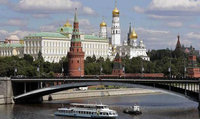Russia to build up troops in Crimea due to growing foreign military presence
Russian Defense Minister Sergei Shoigu said that due to increased foreign presence in Ukraine, "the deployment of complete and self-sufficient group of forces in the Crimean direction" has become one of Russia's priorities.

"The military and political situation in the south-western strategic direction has changed a lot since the beginning of the year. This is largely due to the expansion of the territory of the Southern Military District after the Crimea became a part of Russia," said the minister.
In addition, Shoigu said, the situation in Ukraine "has sharply escalated." According to the head of the Defense Ministry, foreign military presence in the immediate vicinity of the Russian border has increased.
NATO responded to Shoigu's statements by saying that increasing the positions of the Russian army in the Crimea would be a step to increase tension in Europe. "The increasing presence of Russian armed forces in the Crimea is a step to increase tension in Europe," the press service of the military alliance told Itar-Tass.
The statement was made ten days after the NATO summit in the UK, where the participants of the bloc agreed to help Ukraine in the fight against militia forces in the Donbass region.
Advisor to the President of Ukraine Yury Lutsenko said later that weapons would be supplied from the United States, France, Poland, Norway, and Italy, although the authorities of those countries did not confirm the information. Nevertheless, Ukrainian Defense Minister Valery Geletey has recently announced the start of arms shipments from abroad.
As for the "military presence," which Sergei Shoigu mentioned, Ukrainian, Western and NATO officials have set forth similar accusations against Russia before. According to NATO officials, about 20,000 Russian soldiers were stationed near the Ukrainian border as of September 11. Representatives of the alliance noted that approximately one thousand Russian soldiers were already located on the territory of Ukraine.
The Russian authorities, in turn, refute such accusations. NATO has not been able to provide one single proof in support of its accusations against Russia.
Meanwhile, Russian Foreign Minister Sergey Lavrov believes that the West is waging a media war against Russia with its statements of Russia's military intervention in Ukraine. In an interview to Russia Beyond the Headlines, Mr. Lavrov stated that Russia regarded such statements as a manifestation of the information war. "Accusations of Russia's military intervention in the conflict have been voiced before. From the very beginning of the crisis, they accuse us of practically everything, without presenting any facts ever," said the minister.
Lavrov said that "the absence of evidence, concealment and distortion of truth is a characteristic feature of the position of the United States and several European countries." "This goes for the statements about the movements of our troops, the investigation of the Malaysian Boeing disaster, as well as for the tragedies on Maidan, in Odessa, and many other situations," he explained.
Noteworthy, when visiting Estonia on September 3, US President Obama announced that Russian troops entered Ukraine. According to Obama, there was evidence to prove it. The same day, President's press secretary Dmitry Peskov rebutted Obama's statements and said that with that such statements the West was trying to assign a destructive role on Russia. According to Peskov, such statements from Western leaders only speak of "unwillingness to operate with facts." The undeniable evidence of Russia's military invasion of Ukraine has never been provided, which suggests that there is no evidence at all, and the West simply prefers to publicly demonize Russia.
Sergey Lavrov, in the above-mentioned interview, also expressed his point of view regarding the sanctions imposed by the United States and the European Union against Russia because of the Ukrainian crisis. According to him, the West needs to break the vicious circle of "an eye for an eye" action.
"We believe that the attempts to influence crises by unilateral measures that go beyond UN Security Council decisions and contradict to the norms and principles of international law, threaten international peace and stability," said the minister.
The head of the Russian diplomatic mission stressed out that such measures are double-edged and often more dangerous to those who initiate them. "It is clear that the continuation of the sanctions pressure on Russia will not help resolve the internal Ukrainian crisis, but will only deepen the confrontation and complicate dialogue," says Sergey Lavrov.
"The United States, the European Union and other countries need to finally listen to the voice of reason and interrupt the vicious cycle of pointless action based on the principle of "an eye for an eye," which they started themseves," said Lavrov.
In the interview, Sergei Lavrov also said that although the relations between Russia and the European Union undergo a serious test in connection with the "the destructive policy of European partners due to the Ukrainian internal crisis, the point of no return has not yet been reached." "To return to the path of cooperation, it is necessary to overcome the vicious logic of sanctions and threats and switch to constructive and pragmatic search for solutions of accumulated problems," the minister said.
"There is no reasonable alternative to the continuation of mutually beneficial cooperation between Russia and the EU. There are too many things that connect us in terms of geography, economy, history, in human terms," Russian Foreign Minister Sergei Lavrov said.
Pravda.Ru
Subscribe to Pravda.Ru Telegram channel, Facebook, RSS!


